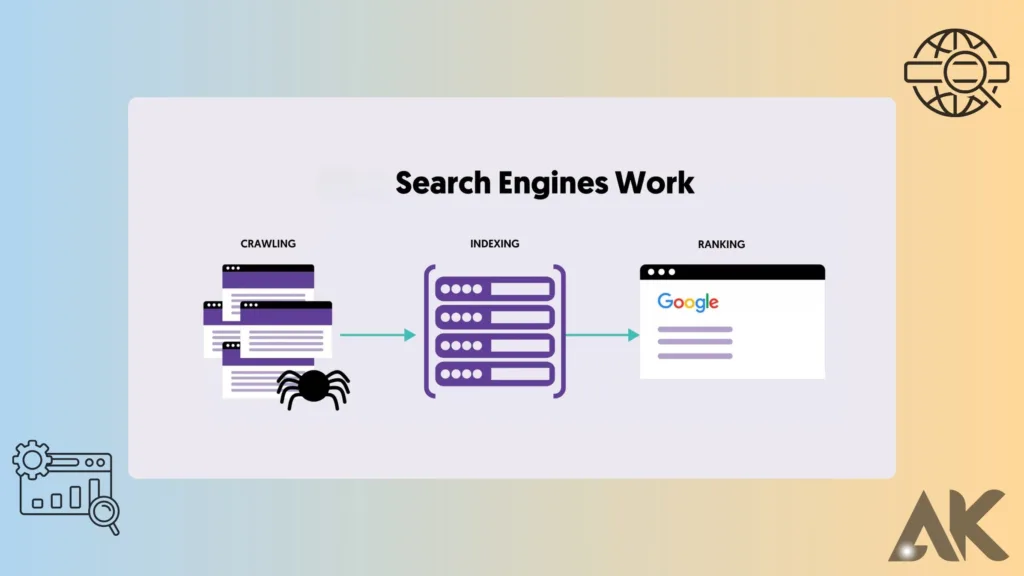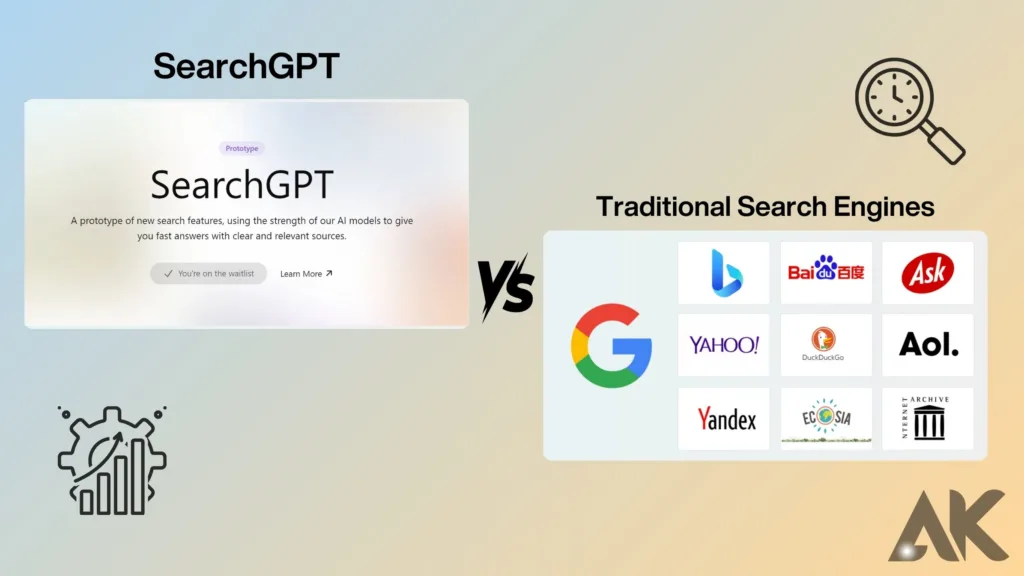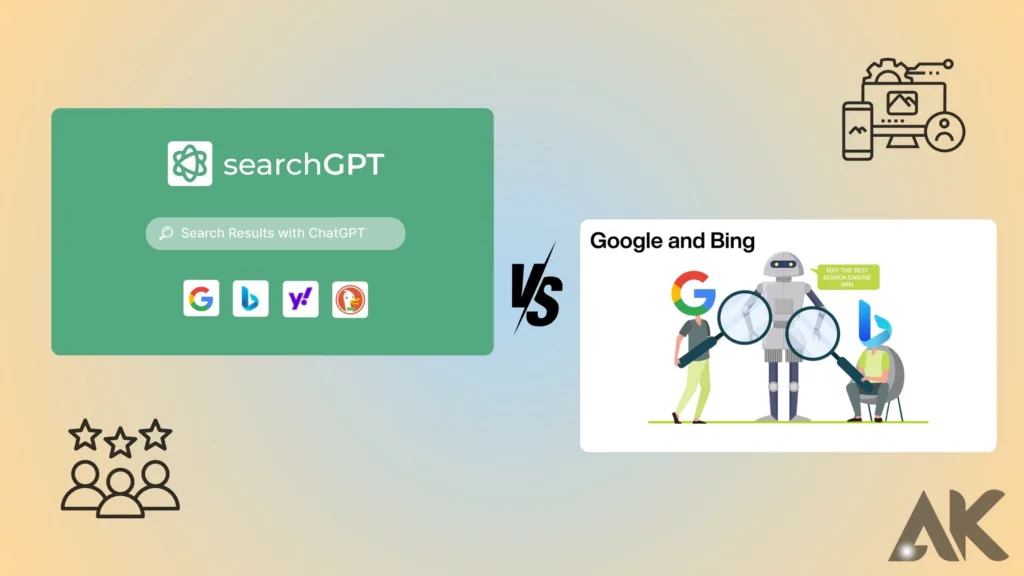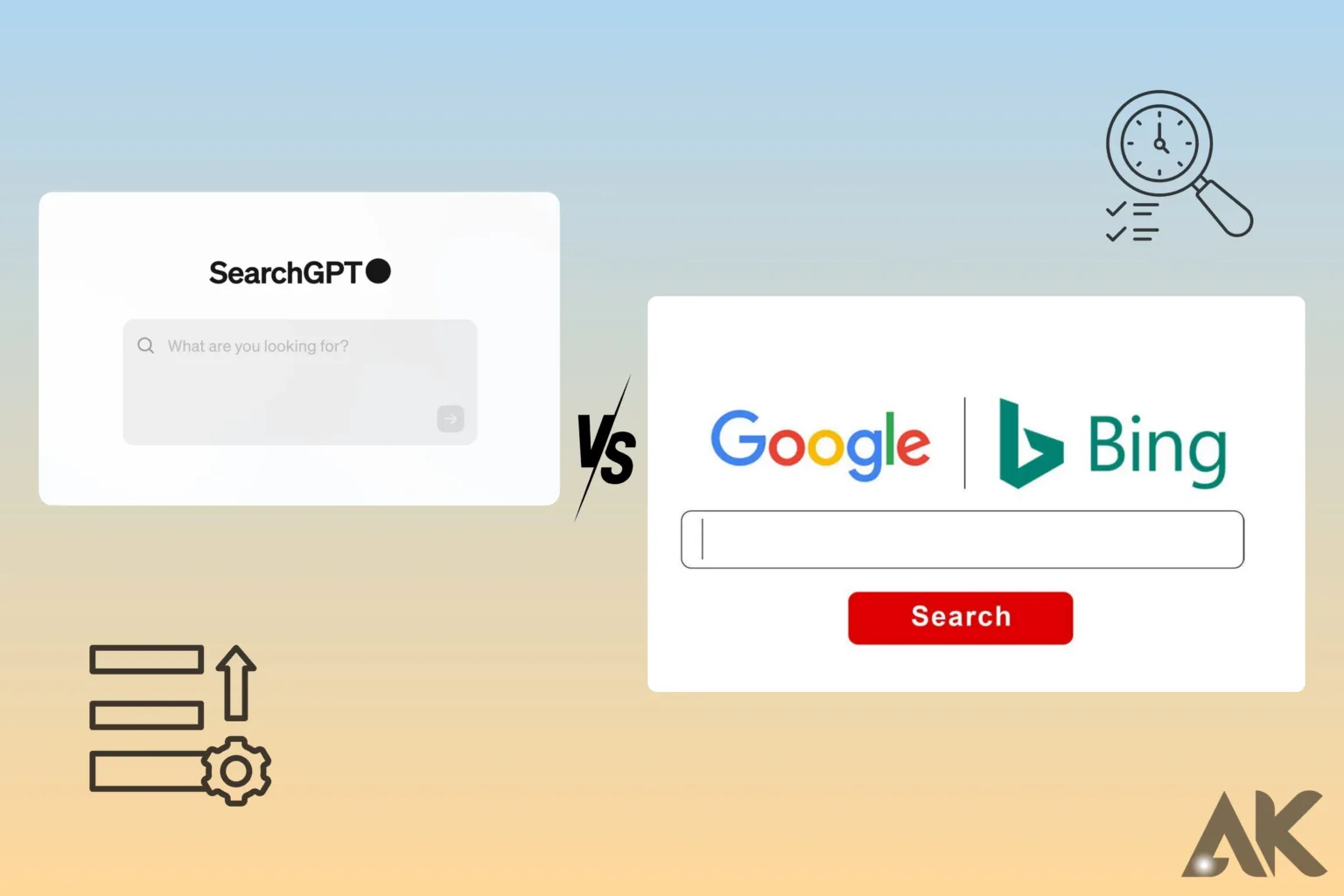SearchGPT vs traditional search engines In today’s fast-paced digital world, search engines serve as our informational portal, assisting us in sorting through mountains of data to discover exactly what we’re looking for. AI-powered search technology [SearchGPT] is challenging the dominance of well-known search engines like Google and Bing with its creative approach to UI design. The ongoing debate over which search engine produces more relevant and helpful results is being fueled by users’ growing interest in contrasting [SearchGPT] with these well-known search behemoths. But what particularly sets [SearchGPT] apart, and how does it compare in terms of search efficacy?
How Traditional Search Engines Like Google and Bing Work

Because of their advanced algorithms that can scan and analyze enormous amounts of web content, traditional search engines like Google and Bing have long dominated the search market. These search engines utilize a combination of machine learning, PageRank, and keyword research to determine each result’s relevance to the user’s query and display the results. The search engine provides a list of web pages that match a user’s query by utilizing a range of index scanning techniques and ranking signals.
For instance, Google’s sophisticated algorithms, which take into account hundreds of variables like the authority and quality of the content, are well known for their ability to deliver remarkably relevant results. Even though Bing uses different algorithms and data sources than Google, it uses comparable strategies to Google, despite occasionally being perceived as Google’s replacement. AI and machine learning were included in both engines as they were developed to enhance user experience and search accuracy.
Search Efficiency: [SearchGPT] vs. Traditional Search Engines

SearchGPT vs traditional search engines Unlike conventional search engines, [SearchGPT] provides an alternative method for improving search efficiency. [SearchGPT’s] improved ability to understand and evaluate natural language queries is one of its main advantages. This implies that users will be able to pose more intricate, conversational queries and yet get accurate, helpful responses. For some searches, [SearchGPT’s] query processing time is very fast due to its AI-driven architecture, which frequently yields results faster than traditional engines.
However, conventional search engines such as Google and Bing do better at presenting results from a wider variety of sources, giving users a more thorough view of the web. While they can produce extremely relevant results for the exact terms entered, they might not always be able to properly comprehend the nuances of more complex queries. If a user prefers [SearchGPT’s] speed and conversational capabilities over those of Google and Bing, it will depend on their particular demands and desired level of efficiency when searching.
User Experience: [SearchGPT] vs. Google and Bing

SearchGPT vs traditional search engines Compared to conventional search engines, [SearchGPT] offers a notably different user experience. Compared to a list of links, users interact with [SearchGPT] more conversationally; they feel as though they are speaking with an informed assistant. Users who prefer conducting their research more directly and conversationally may find this to make the search process easier and more enjoyable.
Customers who use Google and Bing’s classic search interfaces, on the other hand, see a list of web pages that are relevant to their query. Although this tactic has been effective for some time, there are times when it seems excessively aggressive, particularly when employing general or ambiguous search phrases. However, Bing and Google have both significantly improved their user interfaces with the addition of components like rich snippets and information panels to improve the search experience.
While traditional search engines like Google and Bing incorporate natural language processing (NLP) into their algorithms, they frequently use a more constrained approach than [SearchGPT]. Although they have some comprehension and interpretation capabilities for natural language, their main advantage is keyword-based search, which might not always fully grasp the context of a question. As a result, users may need to hone their search terms to obtain relevant results, even if [SearchGPT] is more sophisticated and able to answer queries.
Handling Complex Queries SearchGPT vs traditional search engines
SearchGPT vs traditional search engines When presented with complex queries, [SearchGPT] exhibits an extraordinary capacity to evaluate and scrutinize the inquiry, producing outcomes that are precise and suitable for the context. To provide a comprehensive and well-reasoned response, [SearchGPT] can handle queries that ordinary search engines might find difficult, such as multi-part searches or inquiries requiring a high degree of comprehension.
While traditional search engines like Google and Bing are frequently helpful, they may not always be able to provide sophisticated searches, particularly if they are unclear or require careful consideration. In some circumstances, users might need to hone their search phrases or go through several search results before finding what they’re looking for. This is the truly shining moment for [SearchGPT].
The Role of AI in Search Recommendations
SearchGPT vs traditional search engines Search recommendations from [SearchGPT] and other popular search engines like Google and Bing are heavily influenced by artificial intelligence. With the use of artificial intelligence, [SearchGPT] examines user preferences and behaviour to make recommendations that are more likely to be in line with the goals of the user. This tailored method reduces the time users must spend searching through irrelevant results and may help them locate what they’re looking for more quickly and easily.
Artificial intelligence (AI) is also used by Google and Bing in their recommendation systems, but they usually take a broader stance and give more weight to general trends and data patterns than to specific user activity. Although this could be useful in providing, [SearchGPT] often provides a greater degree of customization. Although [SearchGPT] currently provides a more customized search experience, as AI develops, the distinctions between these various methods may become less important.
Conclusion
SearchGPT vs traditional search engines Ultimately, the user needs to determine for himself, based on their own needs and interests, whether to use [SearchGPT] or other popular search engines like Google and Bing. With the use of AI and NLP, [SearchGPT] provides a more conversational and customized search experience by displaying results that are pertinent to the current situation. Despite this, Google and Bing continue to control a substantial portion of the search market because of their wide distribution and powerful search features. Search users should anticipate much more from search technology since it is predicted to fundamentally change how we interact with the digital environment.
FAQ
Q1: What sets [SearchGPT] apart from Google?
Unlike Google, [SearchGPT] provides more contextually relevant and customized search results by utilizing artificial intelligence (AI) and natural language processing (NLP). Although Google prioritizes algorithmic ranking and keyword matching, [SearchGPT] focuses on understanding the purpose of the query and offering conversational responses.
Q2: Can [SearchGPT] replace traditional search engines?
Though [SearchGPT] offers a unique and innovative search experience, it is unlikely to completely replace more well-known search engines like Google and Bing. Users can choose between the comprehensive search coverage of Google and Bing and the conversational features of [SearchGPT] based on their specific needs. There are benefits to each over the other.
Q3: Is it possible to access [SearchGPT] anywhere?
Indeed, [SearchGPT] is designed to be as user-friendly as possible for individuals worldwide. It strives to give a uniform search experience independent of the user’s location and supports multiple languages.
Q4: How does [SearchGPT] impact SEO?
Because of [SearchGPT], SEO strategies are evolving, with an emphasis now more on creating contextually rich and relevant content for users. This means that to optimize for AI-driven search engines, businesses may need to reevaluate their traditional SEO tactics.
Q5: What privacy implications arise from using [SearchGPT]?
[SearchGPT], which prioritizes user privacy and data security, handles search inquiries in the strictest confidence. Unlike traditional search engines, [SearchGPT] prioritizes user privacy and may utilize user information for customized advertising.

